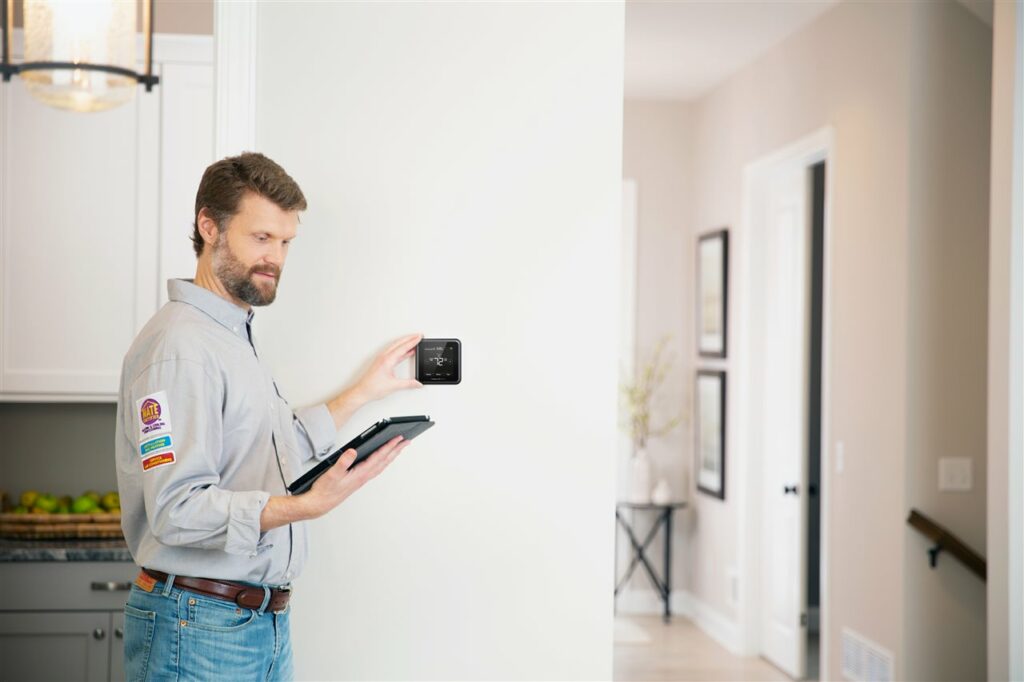Thermostats nationwide are flipping from cool to heat mode. In fact, most Americans begin turning on their heat in September, and they are in full heat mode by the end of October, according to data from Resideo’s Honeywell Home smart thermostats. That shifts a month or two if you’re in the South, but make no mistake, winter is coming.
“As meteorological fall begins, we see an increase in the number of homes that switch on their heating,” says Remya Raghunath, lead data analyst at Resideo. “Not only do we see customers begin to turn on their heat, historically customers also use the change in season to update their heating controls and upgrade to smart thermostats.”
Annual heating maintenance checklist
Just as you wouldn’t go on a long road trip without preparing your car first, winter is a long journey for your heating system. Follow this checklist to prepare your home for months of reliable heat.
1. Schedule a tuneup appointment
Many HVAC contractors run deals for contactless inspections prior to winter. Call for an appointment and ask if they check the heat exchanger for damage as well. This quick visual inspection helps ensure a warm home month after month.
2. Change the filter
The HVAC air filter should be changed regularly according to the manufacturer’s guidelines. This helps your heating system run better and longer, plus improves the quality of the air in your home.
3. Turn on the fan
Feel vents for good air flow and listen for any unusual noises, such as squeaks, grinding or slamming. Contact an HVAC professional if you notice anything out of the ordinary.
4. Turn on the heat
Before it’s needed, test your heater by running it for 15 to 20 minutes to ensure normal operation. If it shuts off before meeting the set temperature, you may need a contractor to diagnose and resolve the problem. Additionally, furnaces typically have an error indicator light on the front cover. Typically, a slow pulsing light flash indicates the system is running normally. If you see fast flashing, or a series of fast flashes, your furnace may need service.
Keep in mind, a slight odor is common when turning on your heating system for the first time in the fall — turning on your heat early gives you a chance to open the windows to clear the smell. If the odor persists, call a contractor immediately.
5. Check your thermostat schedule
Today’s modern thermostats are simple to program so it may make sense to tweak your settings slightly. To maximize savings, keep your home slightly cooler in the winter (one or two degrees) so your heating system doesn’t have to run as often.
6. Adjust your air vents
In the summer, homeowners typically close air vents downstairs and open the vents upstairs. In the winter, open the vents downstairs and close the vents upstairs because the warm air naturally rises. If a particular room is too hot or cold, adjust the vents before you crank up the thermostat or consider a thermostat with room sensors.
7. Check your humidifier pad
Some systems come with a whole-home humidification system often used in dry winter months. Now is the right time to check or replace the humidifier pad. Maintaining a balanced humidity level helps prevent static shocks, cracked skin, snoring and some illness.
8. Upgrade your thermostat
From learning how to heat your home more efficiently to using a schedule, a smart thermostat can efficiently deliver comfort when you’re home and energy savings when you’re away. What’s more, the devices can be installed quickly and simply. Check out Resideo’s Honeywell Home smart thermostats and make the change before winter.
Susan Brewer Service First Real Estate (636)936-8600
Published on 2021-10-05 13:24:53


